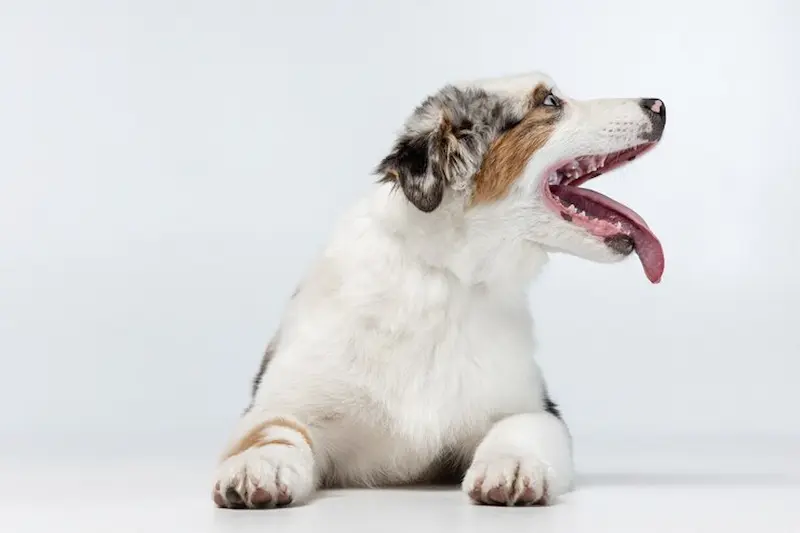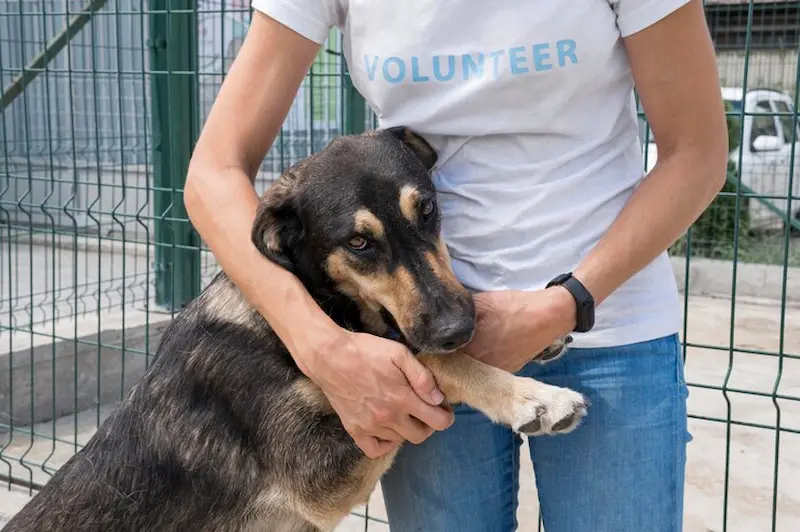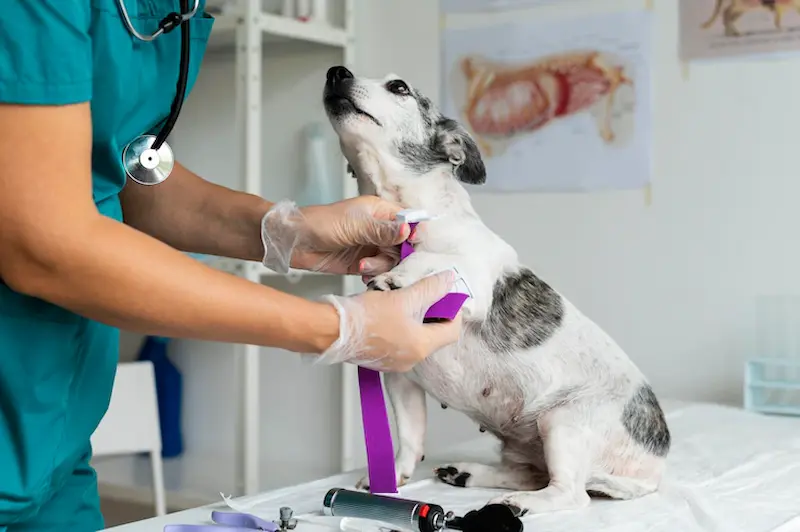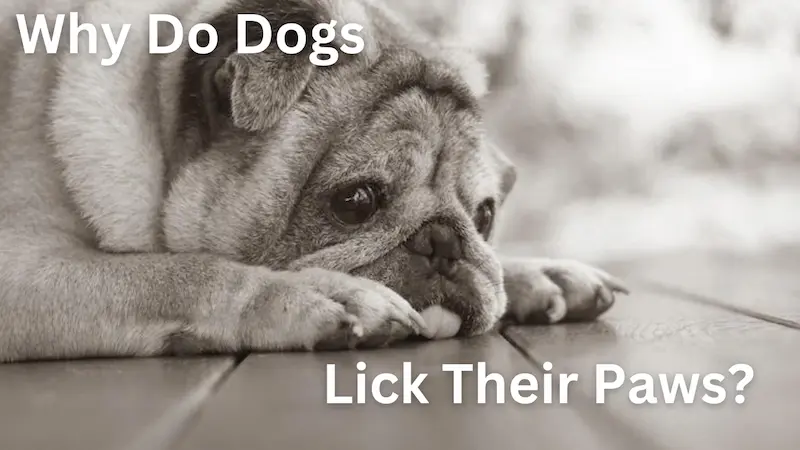Why Do Dogs Lick Their Paws? If you’re a dog owner, you’ve probably noticed your furry friend licking their paws from time to time. While it might seem like a harmless habit, paw licking in dogs can be indicative of various underlying issues. In this article, we’ll delve into the reasons why dogs lick their paws, ranging from natural instincts to potential health concerns. Understanding this behavior can help you ensure your pet’s well-being and provide them with the care they need.
Normal Grooming:


Dogs, often referred to as “man’s best friend,” have an innate sense of cleanliness. Licking is a part of their natural grooming behavior. Just as cats groom themselves by licking, dogs use their tongues to clean various parts of their bodies, including their paws.
When your dog licks their paws, it’s akin to you using a washcloth to clean your face. They remove dirt, debris, and small wounds that may accumulate during their daily adventures. In fact, the abrasive texture of a dog’s tongue serves as a perfect tool for such cleaning tasks. Moreover, licking helps stimulate blood flow to the area, aiding in the healing process if there are minor injuries.
Remedy: There’s generally no need to intervene when it comes to normal grooming behavior. However, it’s essential to ensure that your dog’s paws are clean and free from any foreign objects or wounds. If you notice your dog excessively licking a specific paw or if they start showing signs of discomfort, it’s advisable to consult your veterinarian to rule out any underlying issues.
Itchy Skin:
One of the most common reasons dogs lick their paws is due to itchy skin. Just like humans, dogs can experience itching for various reasons, and their paws often bear the brunt of this discomfort. The itchiness can result from a wide range of factors, including allergies, insect bites, or skin irritations.
Imagine how you might scratch an itchy insect bite on your arm. Dogs, unable to scratch themselves with their paws, resort to licking as a way to soothe the irritation. It’s their natural response to alleviate discomfort.
Remedy: Identifying the source of the itching is crucial. If your dog has allergies, your veterinarian may recommend allergy management strategies, such as dietary changes or prescribed medications. For other irritants like insect bites, keeping your dog’s environment clean and using pet-safe insect repellents can help reduce the chances of itching.
Allergies:
Allergies in dogs are more common than you might think. Environmental allergens like pollen, dust, and certain foods can trigger allergic reactions. Paw licking can be a prominent sign of allergies, as dogs may try to relieve itching and inflammation by repeatedly licking their paws.
Think of it as the way you might rub your eyes if they’re itchy due to allergies. Dogs use their paws as their primary tool for addressing the irritation.
Remedy: The first step is to work with your veterinarian to identify the specific allergen causing the reaction. Once the allergen is pinpointed, a tailored management plan can be developed. This may involve dietary changes, hypoallergenic shampoos, or prescribed medications to alleviate allergy symptoms and reduce the need for paw licking.
Pain or Discomfort:


Pain or discomfort in a dog’s paws can be another significant trigger for excessive licking. Dogs, being masters of non-verbal communication, use behaviors like licking to convey their discomfort. Injuries, splinters, or foreign objects lodged between their toes can cause varying degrees of pain.
To understand this better, think of how you might respond if you stepped on a sharp object or had a splinter in your finger. Your instinct would likely be to address the source of discomfort, and for dogs, licking is their way of doing just that.
Remedy: If you suspect that your dog’s paw licking is due to pain or discomfort, it’s crucial to carefully inspect their paws. Look for any visible injuries, foreign objects, or signs of swelling. If you find anything unusual, consult your veterinarian for proper removal or treatment. In cases of injuries, keeping the area clean and providing any prescribed pain relief or antibiotics is essential for a full recovery.
Anxiety and Stress:
Dogs, despite their robust appearances, can experience anxiety, boredom, or stress, much like humans. For some dogs, excessive paw licking can be a self-soothing behavior in response to these emotional stressors.
Think of it as the way some people might bite their nails or tap their fingers when they’re nervous or anxious. Dogs resort to licking their paws as a coping mechanism to help them feel more at ease.
Remedy: Identifying and addressing the source of your dog’s anxiety or stress is crucial. Creating a safe and calming environment for your pet, providing mental stimulation, and ensuring they get regular exercise can help alleviate these emotional triggers. In some cases, consulting with a professional dog behaviorist or veterinarian may be necessary to develop strategies for managing your dog’s anxiety without resorting to paw licking.


Yeast or Bacterial Infections:
Yeast or bacterial infections can affect a dog’s paws, particularly in the areas between their toes. These infections can be itchy and uncomfortable, prompting your dog to lick the affected areas as a way to find relief.
To draw a human parallel, think of how we might scratch an itchy, infected cut or wound. Dogs use licking as their way of addressing the irritation and discomfort caused by these infections.
Remedy: If you suspect that your dog has a yeast or bacterial infection on their paws, it’s essential to consult your veterinarian for a proper diagnosis and treatment plan. They may recommend topical or oral medications, as well as specific hygiene practices to keep the paws clean and dry.
Behavioral Habit:
In some cases, paw licking can develop into a habitual behavior. Dogs are creatures of routine, and if they start licking their paws for any reason, it can become a repetitive habit even after the initial cause is resolved.
Consider how some people develop habits like nail-biting or hair twirling. Dogs can fall into a similar pattern of behavior, where they continue licking their paws out of habit, regardless of whether there’s an underlying issue.
Remedy: Breaking a habitual behavior can be challenging, but it’s not impossible. To address this, it’s essential to provide alternative sources of stimulation and distraction for your dog. Engaging toys, interactive puzzles, or increased exercise can help redirect their attention away from paw licking. If the habit persists, consult with a professional dog trainer or behaviorist for further guidance.
Dry or Irritated Skin:
Just as humans experience dry and itchy skin, dogs can too. Dry or irritated skin on the paws can lead to excessive licking as your dog tries to moisturize the area or alleviate discomfort.
Imagine how you might apply lotion to soothe dry skin on your hands. Dogs use their natural saliva as a moisturizing agent when they lick their paws.
Remedy: Addressing dry or irritated skin often involves regular paw maintenance. You can use pet-safe paw balms or moisturizers recommended by your veterinarian to keep the paw pads hydrated. Additionally, identifying and eliminating any potential allergens or irritants in your dog’s environment can help prevent future skin issues.
Excessive Heat or Cold:
Extreme temperatures, whether hot or cold, can impact your dog’s paw pads. In hot weather, pavement and surfaces can become scorching, while cold temperatures can cause paw pads to become dry and cracked. Dogs may lick their paws to cool them down in the heat or provide moisture in cold, dry conditions.
To relate this to humans, think of how we might lick our lips in response to extreme temperatures or dryness. Dogs use a similar instinct when it comes to their paw pads.
Remedy: The remedy for extreme temperatures largely involves environmental management. In hot weather, avoid walking your dog on scorching surfaces, and provide them with shaded areas and plenty of water. In cold conditions, protect their paws with booties or limit outdoor exposure during extreme cold snaps.
Fleas or Ticks:
Fleas and ticks are common pests that can infest a dog’s paws. These tiny parasites can cause itching and discomfort, leading to paw licking as your dog attempts to alleviate the irritation.
To draw a human parallel, imagine how we might scratch our skin if we felt a tickle or itch caused by an insect crawling on us. Dogs use licking as their way of dealing with these pests.
Remedy: Regular flea and tick prevention are essential for keeping your dog free from these parasites. Consult with your veterinarian to choose the right preventive measures for your pet. If you suspect a flea or tick infestation, seek immediate treatment to eliminate the pests and relieve your dog’s discomfort.
Be cautious while doing this, as an injured or frightened dog may react defensively. If you can safely remove the object or address the injury, do so. However, if the issue is severe or you’re unsure, consult your veterinarian for proper examination and treatment.
Medical Conditions:


Underlying medical conditions, such as arthritis or joint pain, can lead to paw licking in dogs. When a dog experiences discomfort or pain, they may lick their paws in an attempt to soothe the affected area.
To draw a human parallel, consider how we might massage or rub a sore muscle to alleviate pain. Dogs use licking as their version of this self-soothing technique.
Remedy: If you suspect that an underlying medical condition is causing your dog’s paw licking, it’s crucial to consult with your veterinarian. They can perform a thorough examination, diagnose the issue, and develop an appropriate treatment plan, which may involve pain management, medications, or physical therapy.
Understanding why dogs lick their paws is the first step in addressing this behavior effectively. Keep in mind that while occasional paw licking is normal, excessive or persistent licking may be a sign of an underlying issue that requires attention. Observing your dog’s behavior, consulting with your veterinarian, and providing appropriate remedies can help keep your furry friend happy, comfortable, and healthy.
Why Do Dogs Lick Their Paws
Q1: Why does my dog suddenly start licking its paws excessively?
A1: Sudden excessive paw licking in dogs can be due to various reasons, such as allergies, injuries, or stress. It’s essential to observe your dog’s behavior and consult with a veterinarian if the licking persists.
Q2: Can I use over-the-counter creams to treat my dog’s paw licking?
A2: It’s not advisable to use over-the-counter creams or medications without a veterinarian’s guidance. The cause of paw licking varies, and using the wrong treatment can worsen the issue. Consult your vet for proper diagnosis and treatment.
Q3: How can I tell if my dog’s paw licking is due to allergies?
A3: Allergic reactions in dogs often lead to paw licking, along with other symptoms like itching, sneezing, or digestive issues. If you suspect allergies, consult your vet to identify the allergen and discuss appropriate treatment options.
Q4: What can I do to prevent my dog from licking its paws excessively?
A4: Preventing excessive paw licking involves identifying and addressing the underlying cause. This may include allergy management, providing mental and physical stimulation, and creating a stress-free environment. Your vet can provide personalized guidance.
Q5: Are there any home remedies to soothe my dog’s irritated paws?
A5: While there are some home remedies like Epsom salt soaks for minor irritations, it’s crucial to consult with your veterinarian first. Home remedies may not be suitable for all paw issues, and professional advice is essential for proper care.

